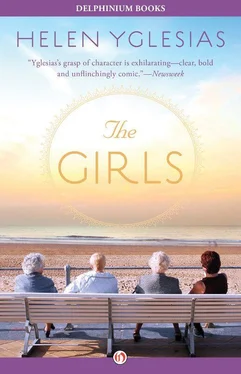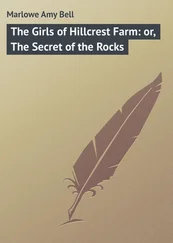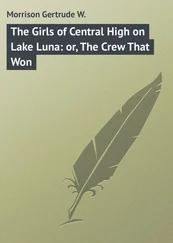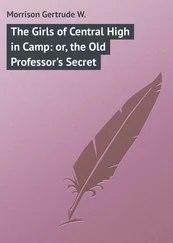To prolonged applause, Flora was introduced by the aged, lively male director of activities in a marked New York Jewish singsong. Flora had apparently decided to enhance her glamour by having him mention Jenny, whom he described as “the well-known professional writer sister of the star of the occasion, a woman with so many accomplishments it would take me half a day to recite them, a professor, a lecturer, a writer …” At the close of his remarks, when he asked Jenny to rise, she nodded her head, gesturing toward Flora as the one star of the occasion, and sat down quickly, ignoring the continuing applause. The audience liked to clap hands. It gave them something to do.
A man seated nearby was thrilled by Jenny’s presence, going on about his son, “a noted professor at the University of Illinois. Surely you know Professor Meyer Asher? Very well known, very well thought of.” She nodded, smiled, frowned, put her finger to her lips, pointed meaningfully at Flora, who was struggling to be heard over the general din. A woman whose entirely wrinkled face was lit up with delight approached slowly with the help of her three-footed walker, clearly eager to talk to Jenny, but the activities director intervened, determinedly seated her, and commanded the audience to quiet down. The excited rustling subsided somewhat.
Flora began with a joke. Jenny was so tense, so convinced that Flora was headed for total disaster, that she understood nothing of the content. The activities director led the laughter and applause, and the audience joined in enthusiastically, those who were still awake. The room was hot and airless, and there was a low hum of rasping breath. Here and there someone snored.
Flora proceeded with her multimedia memoir: the story of her life through anecdote, poetry, a display of blown-up family photographs, a couple of songs, a little waltzy parody dancing, and some piano playing, random bits of Mozart, Bach, Beethoven, Satie. Slowly Jenny calmed down enough to hear. The fact was that Flora was dazzling in an egocentric, crazy, contemporary way. If Flora weren’t her sister, if the performance were a stranger’s, it would have started buzz words rolling around in Jenny’s head: deconstructionist, postmodernist, feminist. But Flora was her sister, and it was all Jenny could do to keep herself from fleeing the room. She stayed. She stayed with her heart pounding, recoiling when she wasn’t laughing, hating what she heard when she wasn’t lost in admiration of its daring.
She was jarred into recognition of a direct quote, without attribution, of a complete sentence from a memoir she herself had published. And another, from Elinor Wylie, also without attribution. Were there other borrowings she hadn’t caught? Was it all simply stolen? Then she found herself laughing aloud as Flora told a story about failing the Papp Test — when her act was rejected by the Public Theater’s founder. That joke was original, or if it wasn’t, Jenny had never heard it before.
Imperceptibly, as the one-hour show continued, the fretful hum in the room rose, and when Flora segued from a poem she had written about Mama into the singing of “My Yiddishe Mama,” a woman square in the middle of the audience stood and joined her, caterwauling in a high moan, keeping a sort of time with Flora, jerking her arthritic body back and forth and side to side to the rhythm— hmmm, hmmm, hmmm, hmmm —while other voices took up the hmmm, hmmm in a demented backup chorus.
In her dashes from mike to piano to floor to mike, Flora had torn off her lamé cap and the purple jacket, but she was still very flushed, a film of sweat on her throat, her curly black hair gone lank. Yet her eyes glowed and her voice stayed true and strong even as the audience accompaniment threatened to swamp the act.
Jenny was appalled. She wanted to rescue Flora, pull her from her self-imposed punishment at the podium. Flora needed no rescuing. She challenged her overstimulated hearers like a winning boxer, hands on hips, head thrown back, joy in all her bearing.
“Well, my friends, would you care to come up here and share my mike with me, or could you give me the courtesy of some silence and some attention? Well, do I hear an answer? I’m not continuing until I have silence.”
The director helped her again. In his deepest tones he demanded “respect for the artiste entertainer of the day. Come on now, you know better, you know how to behave, let’s show our respect for our most unusual artiste entertainer.” He was walking toward the giddy leader of this ego insurrection, shushing and shaking his finger at her, pushing her into a chair, when yet another disturbance erupted. A woman with a broken leg trussed up in an elevated cast was being hastily wheeled out by her nurse. The face of the patient was a strange blue color, and her breathing was noisy. The room quieted.
Flora elaborately thanked the audience, then worked the woman on the gurney into her act, throwing out her arms, pleading in an Al Jolson parody. “Mamele, Mamele, my little Mamele, don’t go, stay with me, I’m good, I’m good, and at my worst I’m not that bad, am I, friends?” The director once again led the laughter and applause, which he tried to steer into an end to the presentation, but Flora outwitted him and sang one last song in a mix of English and Yiddish, bringing her show to a smash conclusion.
Getting out of the home was an impeded advance through infirm admirers, Jenny trailing Flora as she graciously accepted compliments. Once outside, they walked slowly through the heat to Flora’s favorite Italian restaurant, a few blocks away on what Flora always called Fabulous Ocean Drive, as if the adjective were part of its formal name. There had been no time for them to lunch beforehand. Anyway, Flora preferred to perform on an empty stomach. “We actors never eat before a show.”
They were seated outdoors in an area spottily shaded by a beautiful tree Jenny couldn’t identify, at a big round table all of whose extra chairs Flora swallowed up. She placed her jacket and lamé cap on one and her oversized gold bag on another, kicking off her gold pumps to put her feet up on the only chair left. Then she peeled off her lamé stockings, undid the top three buttons of her shirt, closed her eyes, opened her mouth wide, and breathed deeply.
“I’m exhausted. I must have a drink. And I don’t mean water.” She laughed her boisterous laugh.
A busboy had set up menus, flatware, cloth napkins, large stemmed glasses of ice water topped with a slice of lime.
“Where’s our waiter?” Flora’s voice was still the large voice of the actress. “I want a Bloody Mary with a big stick of celery. They do that great here, with a smitch of horseradish.”
“This is on me,” Jenny said. “After-performance celebration.”
“In that case I’ll have another Bloody Mary when I’ve finished the first one.”
“The sky’s the limit.”
“Not that you’ve said a word about my performance. Not that I care. I had enough admirers all over me to satisfy anybody.”
She had indeed been showered with extravagant praise after her show. Did it matter to her that adoration had dribbled out of the mouths of stuttering stroke victims advancing through a thicket of canes, crutches, walkers, and wheelchairs? Was it the crippled source that left her dissatisfied? Or was there never enough praise of any kind? Jenny’s quick kiss and murmur of “wonderful, wonderful” obviously hadn’t satisfied.
“It was amazing,” Jenny said. “Just wonderful.”
“You hated it.” Flora turned aside to stop a waiter and order her drink. “The trouble with you,” she resumed, “is that you’re thoroughly corrupted by the New York scene. You think New York is all that matters, Broadway is all that matters. You have no conception of the breadth of senior events, wherever they take place. I’ve done dozens of them, and believe me, a senior event is just as important as an off-off-Broadway show. Did you know I won first place here in Miami in a worst poetry contest? In your book,” she said, talking through the arrival of her Bloody Mary, stirring vigorously with the full-leafed celery stalk, taking a long drink, half choking as she swallowed, “in your book that would be a disgrace, in my book it’s a triumph. Did you ever hear of Allen Ginsberg? That man is a poet, not the kind of dried-up academic poet you’re always quoting and raving about. You don’t know anything about poetry. He said I was a terrific poet. Where’s your drink? Aren’t you having anything?”
Читать дальше












